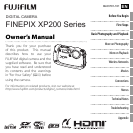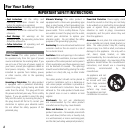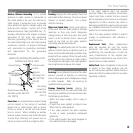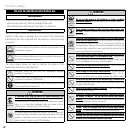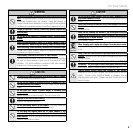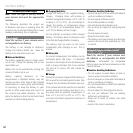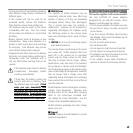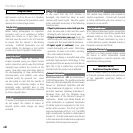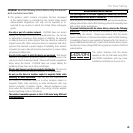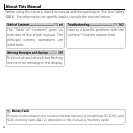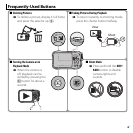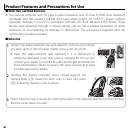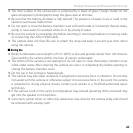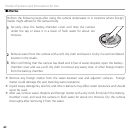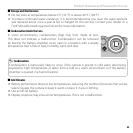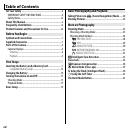
vi
For Your Safety
The Battery and Power Supply
Note: Check the type of battery used in
your camera and read the appropriate
sections.
The following describes the proper use
of batteries and how to prolong their life.
Incorrect use can shorten battery life or cause
leakage, overheating, fire, or explosion.
Li-ion Batteries
Li-ion Batteries
Read this section if your camera uses a
rechargeable Li-ion battery.
The battery is not charged at shipment.
Charge the battery before use. Keep the
battery in its case when not in use.
■ Notes on the Battery
The battery gradually loses its charge when
not in use. Charge the battery one or two
days before use.
Battery life can be extended by turning the
camera off when not in use.
Battery capacity decreases at low
temperatures; a depleted battery may not
function at when cold. Keep a fully charged
spare battery in a warm place and exchange
as necessary, or keep the battery in your
pocket or other warm place and insert it in
the camera only when shooting. Do not
place the battery in direct contact with hand
warmers or other heating devices.
■ Charging the Battery
Charge the battery in the supplied battery
charger. Charging times will increase at
ambient temperatures below +10 °C (+50 °F)
or above +35 °C (+95 °F). Do not attempt to
charge the battery at temperatures above
40 °C (+104 °F); at temperatures below 0 °C
(+32 °F), the battery will not charge.
Do not attempt to recharge a fully charged
battery. The battery does not however need
to be fully discharged before charging.
The battery may be warm to the touch
immediately after charging or use. This is
normal.
■ Battery Life
At normal temperatures, the battery can be
recharged about 300 times. A noticeable
decrease in the length of time the battery will
hold a charge indicates that it has reached
the end of its service life and should be
replaced.
■ Storage
Performance may be impaired if the battery is
left unused for extended periods when fully
charged. Run the battery flat before storing it.
If the camera will not be used for an extended
period, remove the battery and store it in a
dry place with an ambient temperature of
from +15 °C to +25 °C (+59 °F to +77 °F). Do
not store in locations exposed to extremes of
temperature.
■ Cautions: Handling the Battery
• Do not transport or store with metal objects
such as necklaces or hairpins.
• Do not expose to flame or heat.
• Do not disassemble or modify.
• Use with designated chargers only.
• Do not drop or subject to strong physical
shocks.
• Do not expose to water.
• Keep the terminals clean.
• The battery and camera body may become
warm to the touch after extended use. This
is normal.
AA Alkaline/Rechargeable NiMH Batteries/
AA Alkaline/Rechargeable NiMH Batteries/
AA lithium batteries
AA lithium batteries
Read this section if your camera uses
AA alkaline or rechargeable AA NiMH
batteries. Information on compatible
battery types may be found elsewhere in the
camera manual.
■ Cautions: Handling the Batteries
• Do not expose to water, flame, or heat, or
store in warm or humid conditions.
• Do not transport or store with metal objects
such as necklaces or hairpins.
• Do not disassemble or modify the batteries
or battery casing.
• Do not subject to strong physical shocks.
• Do not use batteries that are leaking,
deformed, or discolored.
• Keep out of reach of infants and small
children.
• Insert in the correct orientation.



